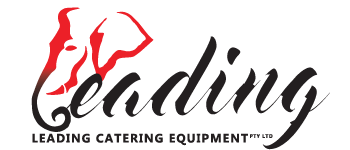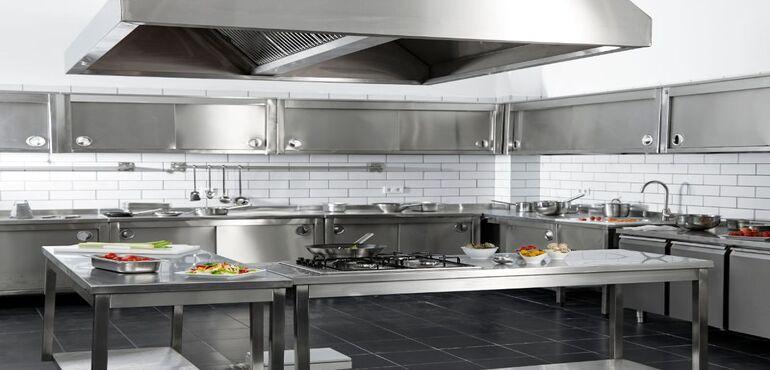Stainless steel is a common item in commercial kitchens. It is known for its durability, resistance to rust, and sleek appearance. In Australia's diverse culinary landscape, maintaining the quality and longevity of kitchen equipment like stainless steel benches is crucial for any restaurant or food service operation. This guide provides top tips for caring for equipment made of this material, ensuring it remains in optimal condition and enhances your kitchen's efficiency and hygiene.
Looking for a product to wash & rinse your dishes simultaneously? Browse our Dishwashers Inlet Sinks Benches to save time and effort.
Understanding the Basics of the Product
Before diving into maintenance tips, it's essential to understand what makes stainless steel unique. This material is an iron, carbon, and chromium alloy, with chromium providing the characteristic resistance to rust and corrosion. The product's non-porous surface prevents bacteria and dirt from becoming embedded, making it a hygienic choice for food preparation. But, it needs reasonable care to maintain its integrity and appearance.
Regular Cleaning Routine
Consistent cleaning is the cornerstone of maintaining this commercial kitchen equipment. Establish a daily cleaning routine that includes the following steps:
- Use the Right Cleaning Products: Avoid harsh agents or tools that can scratch the surface. Instead, use mild detergents or specialised cleaners made for this substance. Vinegar and water mixtures can also be effective for general cleaning.
- Follow the Grain: This material has a grain that is the same as wood. When cleaning, always move in the direction of the grain to avoid scratches and maintain a smooth finish.
- Rinse and Dry: After cleaning, thoroughly rinse the surface with water to remove any residue from cleaning products. Drying with a soft cloth prevents water spots and streaks, which can damage the appearance of the stainless steel.
Dealing with Stains and Discolouration
Despite its name, this substance can get blotted under certain conditions. Common culprits include hard water, acidic foods, and contact with specific cleaning agents.
- Tackling Water Spots: Water spots are common in areas with hard water. Use a mixture of vinegar and water to wipe down the surface, followed by drying with a soft cloth.
- Removing Rust: While stainless steel sinks are resistant to rust, it can develop rust spots, especially if exposed to harsh chemicals or salt. Use a paste of baking soda and water to scrub the rusted area gently, then rinse and dry.
- Polishing: Remove persistent discolouration or restore shine using a polish for this product. Always follow the manufacturer's instructions and first test the polish on a small, inconspicuous area.
Preventing Scratches and Damage
Maintaining the pristine look of stainless steel involves preventing scratches and other damage:
- Avoid Abrasive Materials: It is better not to use steel wool or harsh sponges, as they can scratch the surface. Opt for soft cloths or non-abrasive scrubbers.
- Mind the Temperature: This substance is sensitive to high heat. Do not keep hot pans or pots directly on such surfaces, as this can cause discolouration or warping. Use trivets or pads to protect the material.
- Proper Handling of Utensils: Sharp utensils and kitchen tools can scratch stainless steel surfaces. Try cutting boards and avoid direct contact with the equipment.
Routine Inspection and Maintenance
Regular checking and maintenance can help you catch potential issues early, preventing more significant problems down the line.
- Check for Damage: Regularly check your stainless steel equipment for signs of wear, such as scratches, dents, or rust spots. Quickly resolving these issues can prevent them from worsening.
- Maintain Moving Parts: If your commercial kitchen appliance includes moving parts, such as hinges or wheels, ensure they are lubricated and functioning correctly. This step prevents wear and tear and extends the equipment's lifespan.
- Seal and Protect: Some stainless steel surfaces, especially in high-traffic areas, may benefit from a protective sealant. These sealants can prevent blotting and make cleaning easier.
Do your cutting & washing activities simultaneously with our Workbenches with Sink. Check out our entire collection.
Special Considerations for Australian Conditions
Australia's unique climate and environmental conditions can affect the maintenance of commercial kitchen equipment:
- Humidity and Salt Air: Coastal regions in Australia have high humidity and salt air, which can increase the risk of corrosion. Ensure that stainless steel equipment in these areas is regularly cleaned and protected.
- Temperature Fluctuations: Extreme temperatures can affect your steel. Be mindful of thermal expansion in hotter regions, which can cause warping. In cooler areas, condensation can lead to water spots and potential rusting.
- Outdoor Kitchens: Consider using grades made of this material designed to withstand harsher environments for outdoor commercial kitchens. These grades offer greater resistance to corrosion and weathering. For further information, visit LCE – the leading stainless steel benches supplier in Australia.
Training and Best Practices for Staff
Proper maintenance of this commercial kitchen equipment is a team effort. Ensure that all kitchen staff are trained on the best practices for cleaning and handling steel:
- Standard Operating Procedures (SOPs): Develop and implement SOPs that detail the cleaning and maintenance routines for all such equipment. This step ensures consistency and thoroughness.
- Ongoing Training: Provide regular training sessions to reinforce proper cleaning techniques and introduce any new equipment or procedures.
- Encourage Accountability: Develop a culture of accountability where staff take pride in maintaining the cleanliness and appearance of the kitchen. Regularly recognise and reward efforts to keep equipment in top condition.
Choosing Quality Stainless Steel Equipment
Investing in high-quality stainless steel equipment is crucial for longevity and ease of maintenance. When purchasing new equipment, consider the following:
- Grade and Gauge: Higher grade of steel offers better resistance to corrosion and damage. The gauge, or thickness, of the classic material, also affects its durability.
- Manufacturer Reputation: Choose trusted manufacturers known for their high-quality offerings and dependable customer support. This method can be invaluable when seeking advice or replacement parts.
- Warranty and Service: Ensure the equipment comes with a comprehensive warranty and access to service and maintenance support.
Environmental Considerations and Sustainability
As sustainability becomes increasingly crucial in the hospitality industry, products sourced from top stainless steel sink suppliers stand out as a recyclable and environmentally friendly material:
- Recycling and Disposal: Stainless steel is 100% recyclable. When replacing or upgrading equipment, consider recycling old items made of this substance rather than discarding them.
- Sustainable Practices: Encourage eco-friendly practices in the kitchen, such as reducing water and chemical use during cleaning. This step not only benefits the environment but also reduces operating costs.
One of the premium & durable product made of the material mentioned here is a Workbench with Splashback. Check out our offerings now.
Conclusion: The Long-Term Benefits of Proper Maintenance
Proper maintenance of your kitchen equipment in Australian commercial kitchens offers numerous benefits:
- Enhanced Hygiene: A well-maintained surface is easy to clean and disinfect, ensuring high hygiene standards.
- Longevity and Durability: Regular care prevents damage and wear, extending the lifespan of your equipment and providing a better return on investment.
- Aesthetic Appeal: Pristine stainless steel adds to the visual appeal of your kitchen, reflecting professionalism and attention to detail.
- Cost Savings: Preventative maintenance lessens the need for costly repairs and replacements, saving you money in the long run.
In conclusion, maintaining your stainless steel benches & sinks requires regular cleaning, careful handling, and an understanding of the material's unique properties. By following these tips, you can ensure that your equipment remains in excellent condition, supporting a high-quality and efficient kitchen operation in the vibrant culinary landscape of Australia.






